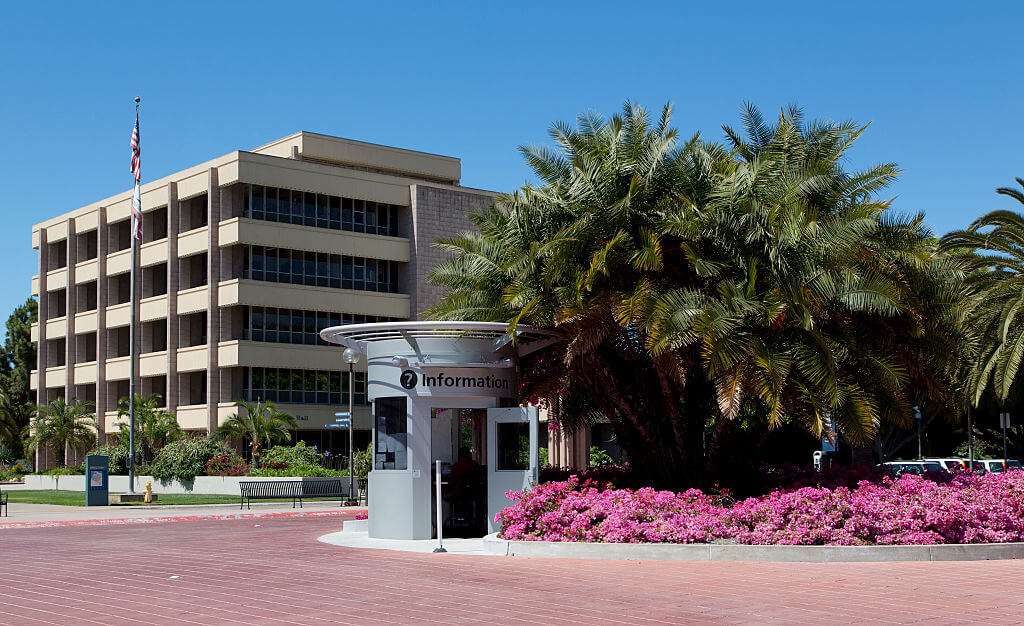‘You can’t hide’: Jewish student leader targeted at University of California multicultural center
‘I do not feel safe on campus,’ says UC Santa Barbara student body president Tessa Veksler, daughter of Soviet refugees

The University of California, Santa Barbara Photo by Carol M. Highsmith/Buyenlarge/Getty Images
A multicultural center at the University of California Santa Barbara was plastered with signs condemning Zionism and targeting the Jewish student body president by name.
“You can run but you can’t hide, Tessa Veksler supports genocide,” read one of the many handwritten signs taped to the walls of the center last weekend.
“I do not feel safe on campus,” Veksler, 21, a senior, wrote on Instagram earlier this week in a series of posts that included photos of the signs. “How can Jewish students feel safe at UCSB when they see a Jewish leader being explicitly targeted? This is dehumanizing and rooted in anti-Semitism.”
Other signs posted at the center included: “Get these Zionists out of office,” “Zionists not allowed,” “When people are occupied, resistance is justified,” and “It was never about Hamas, never will be.”
The university said in a statement that the signs had been removed and that a “bias incident review” was underway “based on potential discrimination related to protected categories that include religion, citizenship, and national or ethnic origin.”
Veksler said on Instagram that she was “booking speaking engagements between now and June,” but she did not immediately respond to the Forward’s requests for comment.
Daughter of Soviet refugees
Veksler said in her posts that her “parents fled the former Soviet Union, where they were discriminated against because of their Jewish identities. They came to the U.S. in search for a society in which they could live freely from antisemitism. A generation later, the same hate has reared its head. but I am not afraid, and I am not going anywhere.”
She added that the incident was “not an isolated event but rather a combination of neglecting to adequately address the implications of such speech and actions within our university.”
The UCSB Multicultural Center is described on its website as having “served, validated, and prioritized marginalized populations on campus” for the past 35 years, with a focus on students of color and combating institutional racism and “other oppressive structures.”
Referring to the word “multicultural” in the center’s name, Veksler wrote, “We see the irony, right?”
A day after her initial posts, Veksler added that she was “completely overwhelmed by the love and support flooding in” online.
Among those publicly expressing support was actress Mayim Bialik. “Tessa Veksler, student body president at UCSB, will not be intimidated,” Bialik wrote. “Creating strife for Jews around the world simply because we exist will not be tolerated. It would not be tolerated by any other minority. Tessa, we’ve got you.”
Other incidents at University of California
Like many campuses nationwide, the University of California system has been rocked by protests and incidents of antisemitism and Islamophobia in the wake of Hamas’ Oct. 7 attacks on Israel and Israel’s war on Gaza.
In addition to countless protests, a UC Davis professor threatened Zionist journalists on social media; a UCLA student said she was fired from her role at the student paper after speaking at a pro-Palestinian demonstration, and on the Berkeley campus Monday, violence erupted outside a theater where an Israel Defense Forces reservist was scheduled to speak. The demonstrators broke a glass door and window and the event was moved to a Chabad rabbi’s backyard.
The University of California’s Board of Regents was supposed to vote earlier this year on a controversial measure to curtail political expression on official channels like university websites. But the vote was delayed until March after some students and faculty blasted the proposal as an effort to quell criticism of Israel and an affront to principles of free speech and academic freedom.
UCSB’s statement on the incidents publicized by Veksler said that the signs she raised concerns about represented “a violation of our principles of community and inclusion.” The school added that the campus community had been notified of a new anti-discrimination policy, issued Feb. 20, that prohibits discrimination or harassment based on national, ethnic or religious origin, ancestry or identity, while also protecting freedom of speech and academic freedom.
“The University strives to create opportunities for civil dialogue, free from bullying and discrimination, that allow all community members to have their voices heard, and to have a space in which to respectfully express their views,” the statement said. “To ensure that we uphold our community values and principles, the campus is committed to thoroughly reviewing and addressing all reported bias incidents.”
















